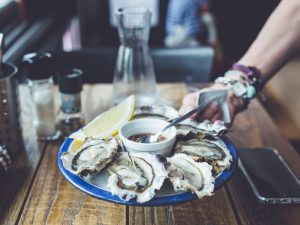How to beat the Christmas bulge!

So, anyone guess the average weight gain over the Christmas period?!
While it’s hard to get exact numbers, articles quote anything from 1 – 5 kg. Mince alors.
And, I’m possibly not the only one who jumps on the scales on January 2 nd, groans and needs the soothing effect of a stiff gin and tonic to help me come to terms with the scary number on the scales. (My dry January tends to last 1 day).
So what’s a girl to do?! Well your strategy possibly depends on whether you are a social butterfly with a calendar full of events from the 1st December or whether you only really have to worry about 2-3 meals (Christmas Eve, Christmas Day and New Years Eve). If you only have a few events, you might well decide to let your hair down, knock back the alcohol and feast on the seasonal goodies.
In any case, it might be useful to have any understanding of where any potential weight gain might be coming from and a list of potential strategies that you can use if you need to. So, welcome to your insider guide to calories and beating the bulge!
Calories
Calories are quite simply a unit of energy (and no, they are not scary creatures that hide in your cupboard and make your clothes tighter every night).
The average woman has a daily energy requirement of 2000 calories (kcals) a day to maintain her weight. Men, because of their greater size and muscle mass have a higher energy requirement of 2,500 kcals a day. This means (sadly) that women therefore need to eat 20% less energy than men, something to remember when dishing up the meals! Note too that this assumes this wonderful average woman/man is doing at least 3 sessions of sport a week. If you do not do any exercise at all, you will need less energy.
Now for the maths, to gain a kilo, you need to eat 7000 kcals more (quite hard in a day, but completely possible over a few day).

For example, a standard Christmas meal
- Drinks and apero: 500 kcals
- Starter (paté and bread): 400 kcals
- Main Meal (all the trimmings): 1000 kcals
- Cheese: 400 kcals
- Dessert: 600 kcals
A grand total of 2900 kcals!
And, assuming you’ve eaten a further 1000 kcals during the day for breakfast and lunch, this gives you a total of 3,900 kcals for the day. You just need 3 or 4 meals like this to nicely gain a kilo…..
Charlotte’s Regle de Ni Ni’
In an ideal world, as/if/when you jump on the scales on 2 nd January, the idea should really be for your weight to be the same as it was on December 1st. ‘The Regle de ‘Ni Ni’’ ni prendre, ni prendre, a weight which is stable. This rule still means that you can enjoy your Christmas, but introduces an element of balance, namely that you intersperse your ‘feast days’ with lighter and more nourishing meals.
This avoids making January a truly miserable month as you sip your detox juices and shiver with cold and hunger.
 Your options are as follows
Your options are as follows
- Alternate lighter and heavier meals. For example, from 26/12 to 30/12, you could (very roughly) keep your calories at 1200 kcals per day (which more than compensates for a 3000 kcal Christmas lunch) by eating compote and yoghurt for breakfast, protein of your choice with vegetables for lunch and a bowl of soup for your evening meal).
- Champagne and oysters are both a luxury and low-calorie option. 12 oysters are roughly 120 kcals, while 2 glasses of champagne are 160 kcals.

Lose weight before Christmas. I have several patients who do this and aim to lose a kg or so before Christmas, which gives them some room (or indeed weight!) to play with. If you keep a beady eye on the scale, this strategy can also work.
Actively monitor your food and drink intake. If you are very sociable during the festive season, you might need to monitor your intake and make certain choices in order to respect the ‘Ni Ni’ rule, and avoid consuming too many calories: For example: Ensure your alcohol intake is not more than 1-2 glasses per event, avoid the apero, zap the bread basket, ask for small servings and don’t have second helpings. You can have 2-3 ‘free’ meals, but if you are out every day, introducing this element of balance will help you both enjoy the festive season and keep your weight stable.
And a final thought. Christmas is indeed a magical time, but the focus does not need to be on food and drink, or at least not all the time! It’s a moment to enjoy precious time with friends and family and relax and unwind, this is what is important during the festive season, not the food.
Charlotte Debeugny – Nutritionniste – RNutr, MSc Nutrition (en savoir +)
